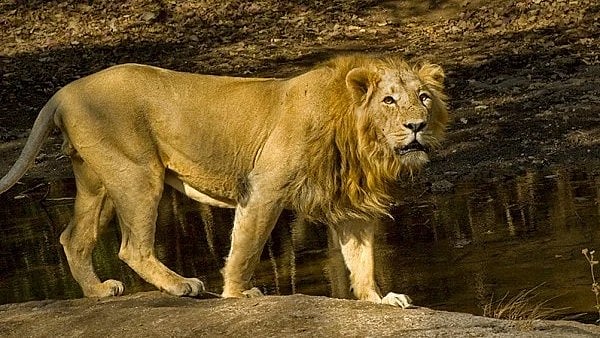Chennai: Officials at the Arignar Anna Zoological Park (AAZP), Vandalur, have launched extensive search and monitoring operations after a young male lion named Sheryaar failed to return to his night shelter from the Lion Safari zone on October 3.
The five-year-old lion, brought from Bannerghatta Biological Park, Bengaluru, in 2023 as part of an animal exchange programme, has been regularly released into the Lion Safari area, which offers visitors a near-natural experience. The safari houses seven of the zoo’s nine lions — three males and four females.
According to zoo authorities, Sheryaar did not return to the enclosure on the evening of October 3, prompting the management to form multiple search teams. The teams sighted the lion inside the safari area the following day, confirming he remained within the 50-acre safari zone.
Pugmarks and rake marks recorded near the compound wall further indicated the animal’s presence and movement within the enclosed area. “These signs suggest that the lion is exploring his environment — a normal and expected behaviour for a young lion,” the Zoo Director said in a statement on Sunday.
To ensure the animal’s safety and monitor its movements, five dedicated teams have been deployed across the safari zone. The area is surrounded by a boundary wall and chain-link fencing, making it secure and preventing the lion from straying beyond the enclosure.
Monitoring has been intensified with the use of normal drones during the day and thermal imaging drones at night. In addition, ten camera traps have been installed to track the lion’s movements and ensure its well-being.
He said similar incidents have occurred in the past when young lions newly introduced into the safari tended to wander but returned safely to their shelters within two to three days.
Principal Chief Conservator of Forests (PCCF) and Chief Wildlife Warden inspected the safari on Saturday, reviewed the arrangements, and instructed the teams to obtain photographic and video documentation of the lion. A team from the Advanced Institute for Wildlife Conservation (AIWC) has also been engaged to assist with monitoring using additional camera traps.
“All necessary precautionary and monitoring measures are being undertaken to ensure the animal’s well-being and safety,” said the Director of AAZP.









